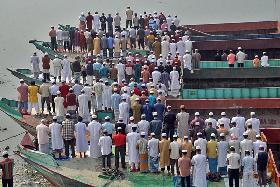
The Bishwa Ijtema, first launched in 1946 and now the second largest congregation of Muslims in the world after the hajj, began on Friday after Jumma prayers on the bank of the Turag river on the oustskirts of the capital.
The three-day Ijtema, which will come to an end with the final prayer Akheri Munajat on Feb. 1, sees hundreds of thousands of devotees from home and some 5,000 from 90 countries joining the congress.
Devotees who have been preparing and gathering for weeks were met with fog on the morning of the first day, but the sun soon appeared later. Last year's Ijtema was cut short after just one day due to inclement weather.
Railway officials said a total of 42 special trains have been launched this for devotees during the Ijtema.
Authorities have imposed restrictions on transport movement on several routes in and around the north of the capital city from Friday.
The roads include Pragati Sarani crossing-Tongi-Gazipur crossing, Abdullahpur-Ashulia-Baipail crossing road, Mirpur road-Beribadh, Mirpur Zoo-Beribadh and Pallabi eastern housing-Beribadh.
Around 10,000 law enforcers—8,000 police, 660 ansar and 800 RAB personnel—have been deployed for safety in and around the Ijtema premises.
Gazipur police super Abdul Baten said devotees have to pass five tiers of security to reach the central stage of the Ijtema.
Detective branch, special branch, crime investigation department and national security intelligence and directorate general of forces intelligence in plain clothes are also keeping a close eye.
The on-duty officer in RAB control room said there are 48 CCTVs set up in the Ijtema ground to ensure security in every nook and corner in the premises.
Two helicopters are also hovering in the sky over the Ijtema ground and its surrounding area, he added.
